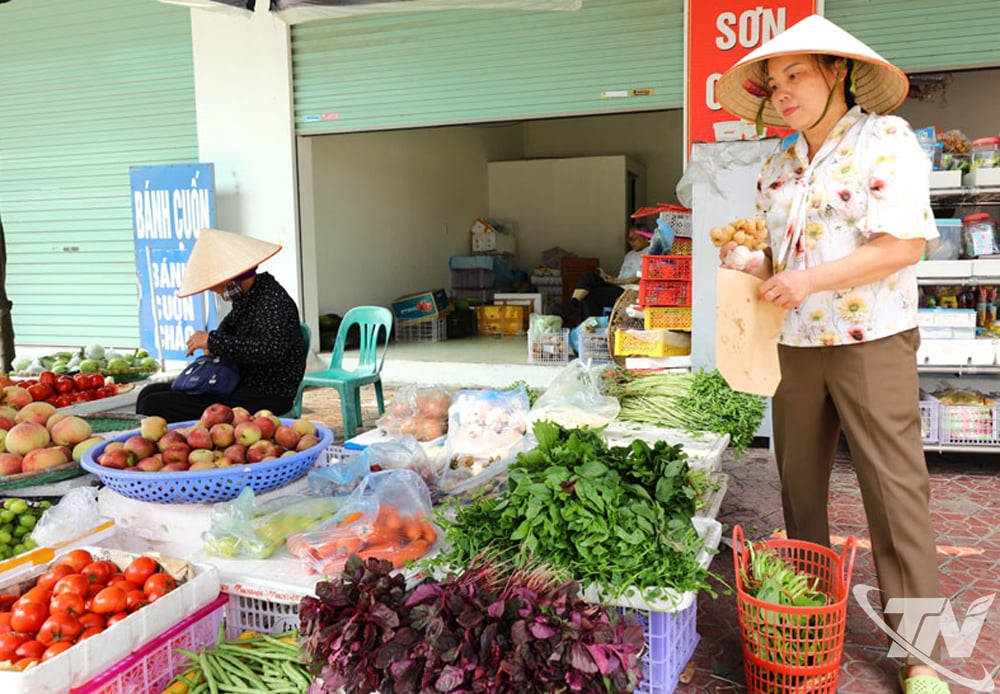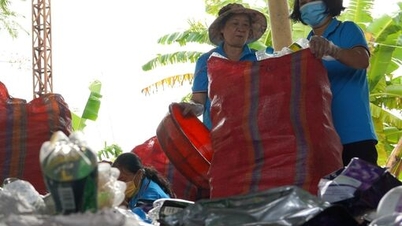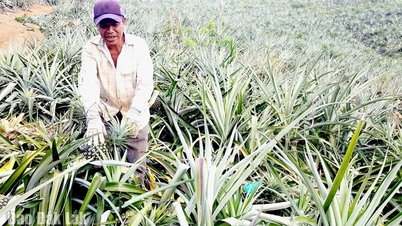 |
| People use paper bags and reusable shopping baskets to reduce their use of plastic bags. Photo: Provided |
According to regulations, from January 1, 2026, hotels and tourist resorts in Hanoi will not be allowed to use or distribute single-use plastic products, including: toothbrushes, razors, cotton swabs, shower caps; and single-use plastic packaging for toothpaste, shower gel, body lotion, shampoo, and hair conditioner.
From January 1, 2027, markets and convenience stores will no longer be allowed to provide free non-biodegradable plastic bags. From January 1, 2028, these establishments must completely cease the circulation and use of non-biodegradable plastic bags, except for packaging goods, etc.
It's easy to see plastic bags everywhere in urban life. From bustling traditional markets to modern supermarkets, from street food stalls to convenience stores, plastic bags are used indiscriminately. They wrap everything from vegetables and meat to takeaway coffee, and then are discarded just minutes after use.
As a result, tons of plastic bags are released into the environment every day, clogging drains and polluting soil and water. Images of canals blackened with floating plastic bags, or huge garbage dumps piled high with all kinds of plastic, have become familiar, revealing an alarming environmental situation.
Restricting plastic waste, especially plastic bags, will contribute to reducing environmental pollution, protecting ecosystems, and safeguarding public health. However, this policy will come with challenges. Changing a habit deeply ingrained in the minds of a large segment of the population is not easy. Even with regulations in place, many people may still find ways to circumvent or ignore them.
Many consumers, especially in traditional markets, are accustomed to receiving free plastic bags and will need time to adapt to bringing their own bags or paying for alternative bags.
Despite facing obstacles, Hanoi's bold decision to ban single-use plastic bags is not just an isolated action, but part of an overall roadmap to reduce plastic waste, aiming for a greener, cleaner, and more beautiful capital city.
Reflecting on Hanoi's experience, we can consider Thai Nguyen . Over the past period, the province has launched numerous movements and activities aimed at reducing the use of plastic bags, promoting a green lifestyle, and protecting the environment. Women's associations at all levels in the province have implemented the "Shopping with reusable baskets" model for their members to minimize the amount of plastic waste released into the environment.
Many stores and supermarkets have temporarily stopped providing plastic bags, encouraging customers to bring their own bags or buy reusable bags.
Organizations and groups actively promote and encourage people to change their habits regarding the use of plastic bags in daily life, aiming for waste sorting and reducing plastic waste. However, after these campaigns and movements, things revert back to how they were before. Therefore, Thai Nguyen should also take similar action as Hanoi.
The plastic bag may seem simple, but the real issue lies in how we consume and dispose of it. If every small action we take daily contributes to a sustainable consumer society, it will reduce plastic pollution and build a truly circular economy.
Source: https://baothainguyen.vn/xa-hoi/202507/cam-tui-nilon-buoc-di-can-thiet-and-dung-cam-cde05f7/


![[Photo] Prime Minister Pham Minh Chinh receives Lao Minister of Education and Sports Thongsalith Mangnormek](/_next/image?url=https%3A%2F%2Fvphoto.vietnam.vn%2Fthumb%2F1200x675%2Fvietnam%2Fresource%2FIMAGE%2F2025%2F12%2F16%2F1765876834721_dsc-7519-jpg.webp&w=3840&q=75)
![[Photo] Prime Minister Pham Minh Chinh receives the Governor of Tochigi Province (Japan)](/_next/image?url=https%3A%2F%2Fvphoto.vietnam.vn%2Fthumb%2F1200x675%2Fvietnam%2Fresource%2FIMAGE%2F2025%2F12%2F16%2F1765892133176_dsc-8082-6425-jpg.webp&w=3840&q=75)
![[Live] 2025 Community Action Awards Gala](/_next/image?url=https%3A%2F%2Fvphoto.vietnam.vn%2Fthumb%2F1200x675%2Fvietnam%2Fresource%2FIMAGE%2F2025%2F12%2F16%2F1765899631650_ndo_tr_z7334013144784-9f9fe10a6d63584c85aff40f2957c250-jpg.webp&w=3840&q=75)
![[Image] Leaked images ahead of the 2025 Community Action Awards gala.](/_next/image?url=https%3A%2F%2Fvphoto.vietnam.vn%2Fthumb%2F1200x675%2Fvietnam%2Fresource%2FIMAGE%2F2025%2F12%2F16%2F1765882828720_ndo_br_thiet-ke-chua-co-ten-45-png.webp&w=3840&q=75)






























![[Online Forum] Protecting the Community - Say No to Heated Tobacco Products](https://vphoto.vietnam.vn/thumb/402x226/vietnam/resource/IMAGE/2025/12/17/1765968642669_toan_20251217144430.jpeg)
















































![[Live] Closing Ceremony and Award Presentation for the "Impressive Vietnam Tourism" Video/Clip Creation Contest 2025](https://vphoto.vietnam.vn/thumb/402x226/vietnam/resource/IMAGE/2025/12/17/1765974650260_z7273498850699-00d2fd6b0972cb39494cfa2559bf85ac-1765959338756946072104-627-0-1338-1138-crop-1765959347256801551121.jpeg)
























Comment (0)